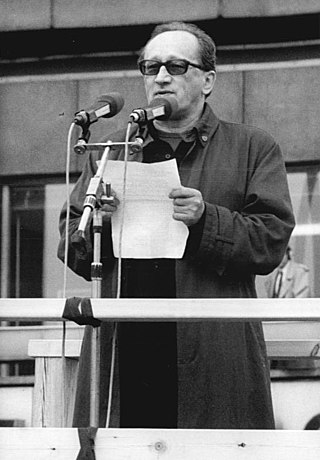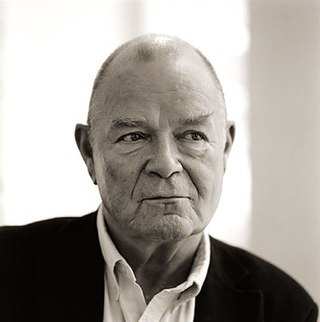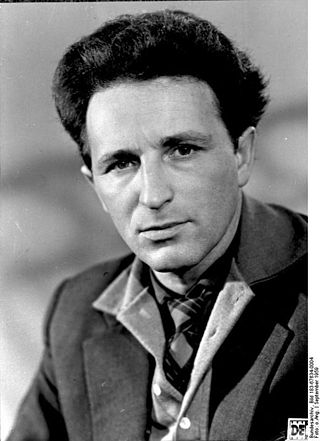Related Research Articles
Articles related to East Germany include:

The culture of East Germany varied throughout the years due to the political and historical events that took place in the 20th century, especially as a result of Nazism and Communism. A reflection on the history of arts and culture in East Germany reveals complex relationships between artists and the state, between oppositional and conformist art. In four decades, East Germany developed a distinct culture and produced works of literature, film, visual arts, music, and theatre of international acclaim. Popular culture specialities included among others a high popularity of nudism in Eastern Germany.

Heiner Müller was a German dramatist, poet, writer, essayist and theatre director. His "enigmatic, fragmentary pieces" are a significant contribution to postmodern drama and postdramatic theatre.
The Berliner Rundfunk (BERU) was a radio station set in East Germany. The station formerly had a political focus and discussed events in East Berlin. Nowadays, it is a commercial radio station with a classic hits music format with the name "Berliner Rundfunk 91.4".

Rundfunk der DDR was the collective designation for radio broadcasting organized by the State Broadcasting Committee in the German Democratic Republic (GDR) until German reunification in 1990.

Dieter Mann was a German actor, director, university professor, and radio personality. In his career, he acted in several theater productions and in over 140 film and television productions. Between 1984 and 1991, he was director of the Deutsches Theater. In 1986, he became a member of the Berlin Academy of Arts. Internationally, he is best known for having portrayed Wilhelm Keitel in Downfall.

Benno Besson was a Swiss Theatre Director.

Thomas Brasch was a German author, poet and film director.

The Maxim Gorki Theatre is a theatre in Berlin-Mitte named after the Soviet writer Maxim Gorky. In 2012, the Mayor of Berlin Klaus Wowereit named Şermin Langhoff as the artist director of the theatre.

Peter Groeger was a German actor and director.

Klaus Gysi was a journalist and publisher and a member of the French Resistance against the Nazis. After World War II, he became a politician in the German Democratic Republic, serving in the government as Minister of Culture from 1966 to 1973, and from 1979 to 1988, as the State Secretary for Church Affairs. He was a member of the Socialist Unity Party (SED) and after German Reunification, the Party of Democratic Socialism (PDS). His son is the German politician Gregor Gysi.

Peter-Michael Diestel is a German lawyer and former politician. He was the last Interior Minister of East Germany, under Prime Minister Lothar de Maizière (1990). As such, he represented the DDR in the negotiations on the unification treaty. He was then a member of the Brandenburg state parliament until 1994.
Stefan Amzoll was a German musicologist, journalist and independent author. In 1989/1990 he was editor-in-chief of Radio DDR 2 and 1990/91 deputy editor-in-chief of Deutschlandsender Culture. A main focus of his work was New Music.
Carlernst Ortwein, pseudonym Conny Odd, was a German classical pianist and composer.

Ulrike Krumbiegel is a German actress. She has performed in more than 100 film and TV productions. In her early career, she performed in East German cinema and theatre. After the re-unification of Germany, her career continued with appearances in crime series such as Tatort, and the ZDF series SOKO München. She has also continued to appear in the theatre, featuring in plays by Berthold Brecht, Henrik Ibsen and William Shakespeare.
Wolf-Dieter Hauschild was a German conductor, choirmaster, artistic director, composer, harpsichordist and university lecturer.
Peter Gotthardt is a German composer, musician and publisher. Film melodies composed by him are known to a wide audience, including major successes such as the pieces Wenn ein Mensch lebt and Geh zu ihr performed by the Puhdys from the 1973 DEFA feature film The Legend of Paul and Paula, directed by Heiner Carow.
Andre Asriel was an Austrian-German composer.

Paul Wiens was a German poet, translator and author of radio plays and screenplays in the German Democratic Republic.
Erich-Alexander Winds was a German theatre director and actor.
References
- ↑ Webber, Andrew (March 9, 2017). The Cambridge Companion to the Literature of Berlin. Cambridge University Press. ISBN 978-1-107-06200-9 . Retrieved March 20, 2024.
{{cite book}}:|website=ignored (help) - ↑ Michael Wolffsohn: Die Deutschland-Akte. Juden und Deutsche in Ost und West. Tatsachen und Legenden. Edition Ferenczy bei Bruckmann München, München 1995, ISBN 3-7654-2730-6. Siehe auch: Heike Schmoll (1995-12-01), [faz.net "Die Deutschland-Akte"], Frankfurter Allgemeine Zeitung (Rezension), no. 280, p. 13, retrieved 2019-04-21
{{citation}}: Check|url=value (help)